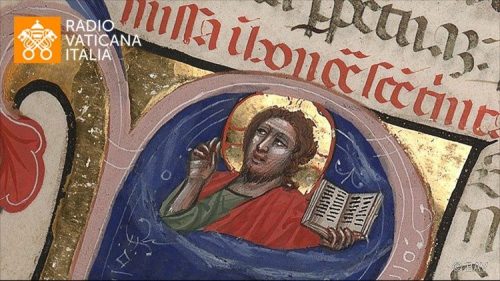READING OF THE DAY
PHIL 1:18B-26
Brothers and sisters:
As long as in every way, whether in pretense or in truth,
Christ is being proclaimed, and in that I rejoice.
Indeed I shall continue to rejoice,
for I know that this will result in deliverance for me
through your prayers and support from the Spirit of Jesus Christ.
My eager expectation and hope
is that I shall not be put to shame in any way,
but that with all boldness, now as always,
Christ will be magnified in my body,
whether by life or by death.
For to me life is Christ, and death is gain.
If I go on living in the flesh, that means fruitful labor for me.
And I do not know which I shall choose.
I am caught between the two.
I long to depart this life and be with Christ,
for that is far better.
Yet that I remain in the flesh is more necessary for your benefit.
And this I know with confidence,
that I shall remain and continue in the service of all of you
for your progress and joy in the faith,
so that your boasting in Christ Jesus may abound on account of me
when I come to you again.
GOSPEL OF THE DAY
LK 14:1, 7-11
On a sabbath Jesus went to dine
at the home of one of the leading Pharisees,
and the people there were observing him carefully.
He told a parable to those who had been invited,
noticing how they were choosing the places of honor at the table.
“When you are invited by someone to a wedding banquet,
do not recline at table in the place of honor.
A more distinguished guest than you may have been invited by him,
and the host who invited both of you may approach you and say,
‘Give your place to this man,’
and then you would proceed with embarrassment
to take the lowest place.
Rather, when you are invited,
go and take the lowest place
so that when the host comes to you he may say,
‘My friend, move up to a higher position.’
Then you will enjoy the esteem of your companions at the table.
For everyone who exalts himself will be humbled,
but the one who humbles himself will be exalted.”
WORDS OF THE HOLY FATHER
Dear Brothers and Sisters, Good morning!
In the scene from today’s Gospel passage, Jesus, in the home of one of the chief Pharisees, observes that the guests at lunch rush to choose the first place. It is a scene that we have seen so often: seeking the best place even “with our elbows”. Observing this scene, Jesus shares two short parables, and with them two instructions: one concerning the place, and the other concerning the reward.
The first analogy is set at a wedding banquet. Jesus says: “When you are invited by any one to a marriage feast, do not sit down in a place of honor, lest a more eminent man than you be invited by him; and he who invited you both will come and say to you, ‘Give place to this man’, and then you will begin with shame to take the lowest place” (Lk 14:8-9). With this recommendation, Jesus does not intend to give rules of social behaviour, but rather a lesson on the value of humility. History teaches that pride, careerism, vanity and ostentation are the causes of many evils. And Jesus helps us to understand the necessity of choosing the last place, that is, of seeking to be small and hidden: humility. When we place ourselves before God in this dimension of humility, God exalts us, he stoops down to us so as to lift us up to himself; “For every one who exalts himself will be humbled, and he who humbles himself will be exhalted” (v. 11).
Jesus’ words emphasize completely different and opposing attitudes: the attitude of those who choose their own place and the attitude of those who allow God to assign it and await a reward from Him. Let us not forget this: God pays much more than men do! He gives us a much greater place than that which men give us! The place that God gives us is close to his heart and his reward is eternal life. “You will be blessed”, Jesus says, “you will be repaid at the resurrection of the just” (v. 14).
This is what is described in the second parable, in which Jesus points out the attitude of selflessness that ought to characterize hospitality, and he says: “But when you give a feast, invite the poor, the maimed, the lame, the blind, and you will be blessed, because they cannot repay you” (vv. 13-14). This means choosing gratuitousness rather than self-seeking and calculating to obtain a reward, seeking interest and trying to increase your wealth. Indeed, the poor, the simple, those who ‘don’t count’, can never reciprocate an invitation to a meal. In this way Jesus shows his preference for the poor and the excluded, who are the privileged in the Kingdom of God, and he launches the fundamental message of the Gospel which is to serve others out of love for God. Today, Jesus gives voice to those who are voiceless, and to each one of us he addresses an urgent appeal to open our hearts and to make our own the sufferings and anxieties of the poor, the hungry, the marginalized, the refugees, those who are defeated by life, those who are rejected by society and by the arrogance of the strong. And those who are discarded make up the vast majority of the population.
At this time, I think with gratitude of the soup kitchens where many volunteers offer their services, giving food to people who are alone, in need, unemployed or homeless. These soup kitchens and other works of mercy — such as visiting the sick and the imprisoned — are a training ground for charity that spreads the culture of gratuity, as those who work in these places are motivated by God’s love and enlightened by the wisdom of the Gospel. In this way serving others becomes a testimony of love, which makes the love of Christ visible and credible.
Let us ask the Virgin Mary, who was humble throughout her whole life, to lead us every day along the way of humility, and to render us capable of free gestures of welcome and solidarity with those who are marginalized, so as to become worthy of the divine reward.
(Angelus, 28 August 2016)

